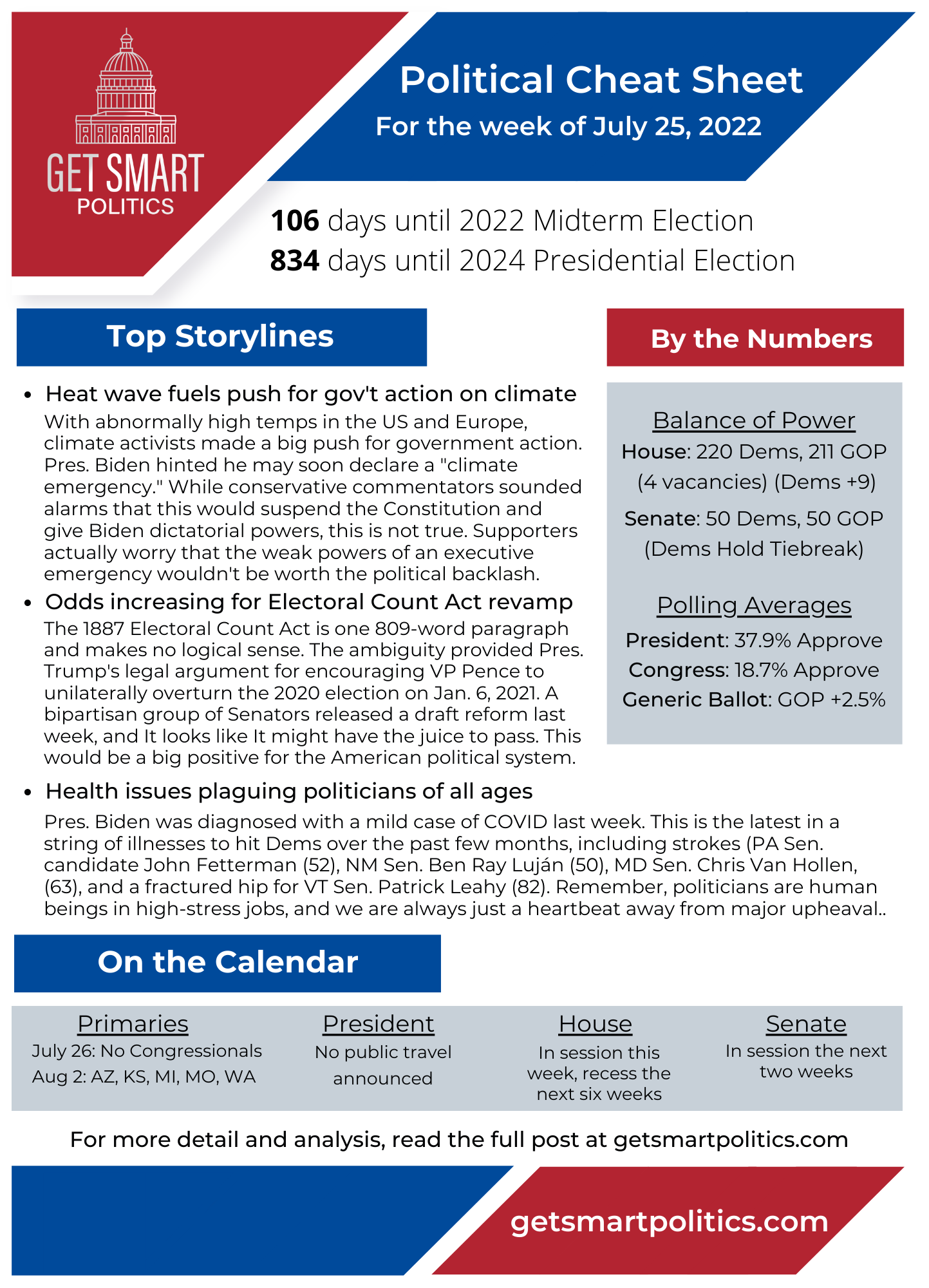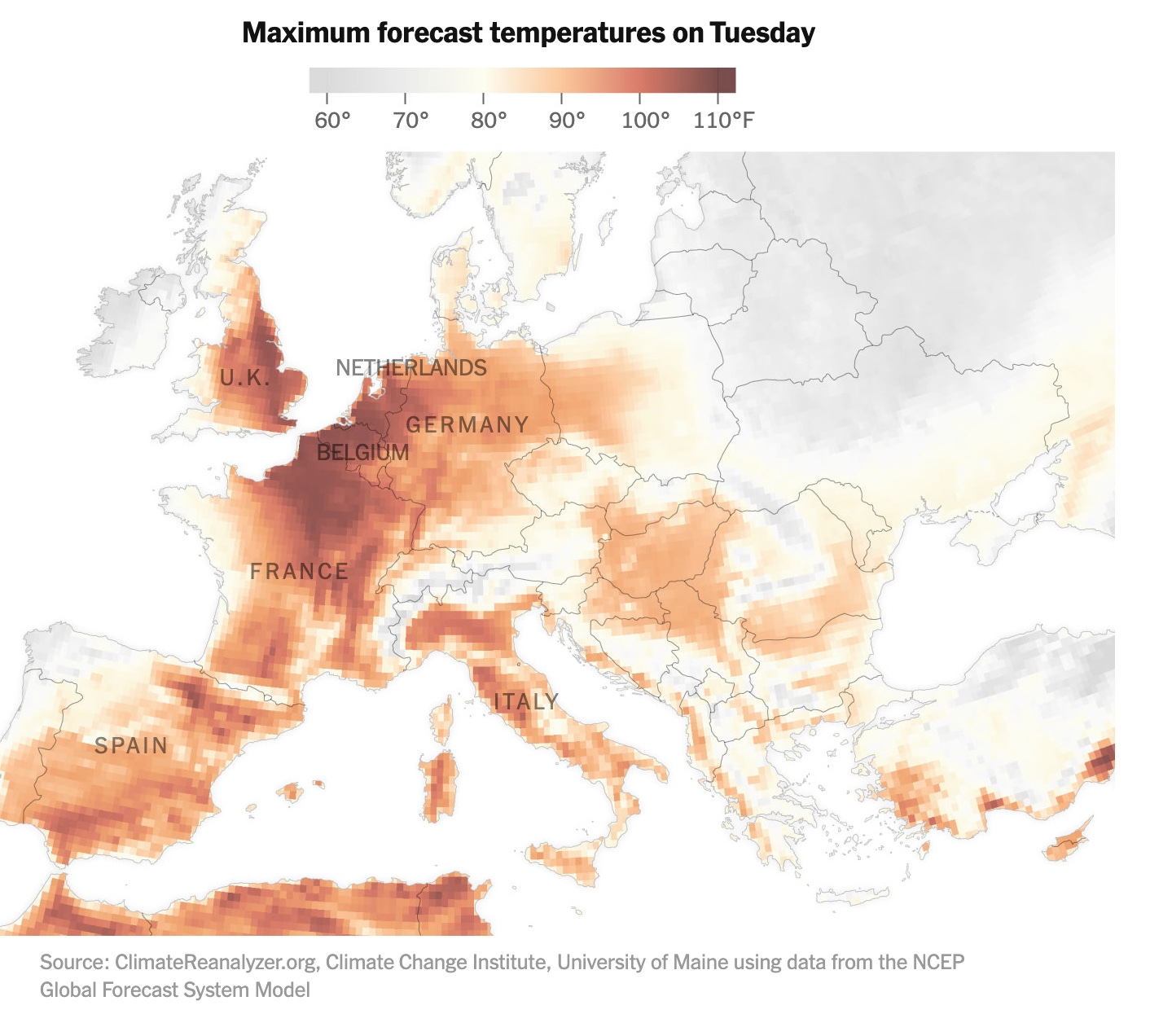Our mission is to bring unbiased political information and analysis to Americans in a way that is interesting and engaging. Thank you for your support!
The results of last week’s poll: Should Donald Trump run for President in 2024? We had 191 votes cast, and all ballots were counted (I swear).
Thanks to everyone who participated! I really like this new feature… nice job, Substack. Let’s try it again:
I’ll share the results next week.
The Political Cheat Sheet comes out Monday mornings. I start with a high-level overview of the info in graphical form. If you don’t have time for anything else, just take a quick look every week. Save the image to your phone's photo library for quick reference until next Monday! If you want more detail, scroll past the image.
What's happening this week
This is your Political Cheat Sheet for the week starting Monday, July 25, 2022.
Today is 106 days until the November midterm elections (about 15 weeks).
We are 834 days from the 2024 Presidential election (about 27 months).
Top Storylines
Worldwide heat wave fuels push for government action on climate
The main story for the past week was the abnormally high temperatures throughout the U.S. and Europe. While these are usually localized phenomena, what made this time different was just how widespread it was. The U.S. was broiling, with widespread areas hitting 100-plus several days in a row. London hit an all-time record high of 104.5 degrees, Belgium and Germany were scorching, and Greenland was seeing short-sleeve weather, melting over six billion tons a day of ice.
Back in Washington, the Biden administration used this backdrop as an opportunity to talk about his efforts to ratchet up a climate change response. President Joe Biden (D) has taken flak from his left wing for not doing more to act on climate policy. After Senator Joe Manchin (D-WV) backed out of climate talks a week and a half ago, climate activists have increased their calls for executive action by the president.
Biden gave a speech in Massachusetts on Wednesday focused on climate policy. While he did not take formal steps to declare climate change a “national emergency,” he used the word “emergency” several times in his speech and called it a “clear and present danger” and vowed to act if Congress does not. The White House said he would not declare a “climate emergency” last week, but that discussions along those lines were ongoing.
Some conservative commentators have warned that declaring a state of emergency would allow Biden to legally suspend the Constitution and effectively become a dictator on anything he deemed climate-related. This is not true. An emergency declaration does allow expanded executive powers, but they are still limited and bound by the Constitution.
This helpful article from The Hill lays out the powers and limits of such a declaration. The main thrust is this:
The declaration would empower Biden to use the Defense Production Act, which could provide loans that could bolster clean energy deployment, and the International Economic Emergency Protection Act, which (Mark Nevitt, a professor at the Emory University’s School of Law) said could prohibit the imports of “harmful climate products” such as chemical compounds that warm the planet and illegally harvested timber from the Amazon.
Nevitt also said that Biden could deploy military construction powers to build renewable energy projects near military bases or other energy security projects.
A declaration would provide a few other opportunities for action, but none so drastic as suspending the Constitution.
Why this matters: No matter how creative Biden gets, his powers are nowhere near as broad as legislative power to make new law. This is especially true considering the Supreme Court’s recent decision in West Virginia vs. EPA, which said that under the “Major Questions Doctrine,” the executive branch does not have the power to read between the lines to enact major new policies that are supposed to be decided by Congress.
Bottom line: Declaring emergencies to get around Congress is not a good precedent or plan, no matter the administration. Given the constraints of executive authority, ultimately if major governmental action is going to happen, Congress is going to have to decide to act.
Odds of Electoral Count Act revamp getting stronger
Few Americans probably realize that the events of January 6, 2021, were driven by the ambiguities of a law passed in 1887, the Electoral Count Act, or ECA. This mess of a statute is 809 words arranged in one paragraph and 10 confusing sentences. The longest sentence is 275 words. This poor 19th-century drafting makes the ECA chock-full of ambiguities and contradictions. Read it for yourself - it’s unintelligible.
The lack of clarity in the statute is what provided the legal cover for President Trump’s efforts to reverse the results of the 2020 election during the January 6 vote-counting session in Congress. Since then, many legal experts and members of the House and Senate have expressed the need to reform the ECA and remove its ambiguities and contradictions.
Last week, a group of 16 Senators introduced the Electoral Count Reform and Presidential Transition Improvement Act of 2022. The group includes nine Republicans - one short of what it would take to pass the Senate, assuming all Democrats stay on board. Among other things, the bill would clarify that the Vice President plays only a “ministerial” role in counting the votes and does not have unilateral authority to accept or reject votes. It also raises the bar to object to a state’s slate of electors from the current level of one member of each chamber to one-fifth of both chambers. After the bill was introduced, other Senators expressed openness to the idea, including some additional Republicans.
Why this matters: Reducing confusion and ambiguity is usually a good thing in the law, and this Is one of the most confusing and ambiguous statutes on the books. The fact that it covers one of the most important parts of our system of government makes it all that much more important to clarify well in advance of the next election.
Bottom line: I believe this will get done in the next few months. It may not make as many headlines as some flashier subjects, but it might be one of the most important pieces of legislation that Congress could pass for the future of our system of government.
Health issues plaguing politicians of all ages
President Biden’s COVID diagnosis made all kinds of headlines this week. Fortunately, it seems like his symptoms are mild and improving. He has even made a public appearance, which is pretty strong evidence that he’s truly doing okay.
We’ve talked a lot about how it seems like the Democrats can’t catch a break lately - this is even true in their own physical health. A few examples:
Pennsylvania Lieutenant Governor, and Dem nominee for U.S. Senate, John Fetterman, 52, suffered a stroke just days before the Senate primary.
Senator Ben Ray Luján (D-NM), 50, also suffered a serious stroke in January, endangering the Democratic majority in the Senate.
Senator Chris Van Hollen (D-MD), 63, also suffered a minor stroke in May, putting him out of commission for some time.
Senator Patrick Leahy (D-VT), 82, the longest-serving Senator, fractured his hip and has had two surgeries to repair it in recent weeks. He was briefly hospitalized in January 2021 with muscle spasms. As the longest-serving member of the majority party, he serves as president pro tempore of the Senate, which puts him third in line to the Presidency.
It’s not only Democrats who have had their share of troubles. Senator Kevin Cramer (R-ND), 61, had a yard work accident in June that resulted in potential finger amputation. I’m sure there are plenty of other examples of accident and illness.
Why this matters: Sometimes we forget that these are human beings who occasionally have ordinary health problems. Members of Congress are under immense physical and mental stress. At any moment, things can change at the drop of a hat.
Bottom line: Keep our elected officials in your thoughts and prayers. It’s best for our country if we resolve our political disagreements at the ballot box rather than the hospital.
What I'm Watching
Here are some of the top stories I read in the past week:
Politics
The 1976 and 1980 primaries are not precedents Biden will want to emulate
The history of primary meddling — and how risky Dems’ attempts in 2022 are
So will Democrats try to boost Trump in the 2024 primaries, too?
Abortion
House Passes Bill to Codify Contraception Rights After Dobbs
A triumphant antiabortion movement begins to deal with its divisions
Where Abortion Is on the Ballot
Congress
House passes bill protecting marriage equality, with 47 GOP members voting ‘yes’
Ocasio-Cortez pushes back on claims she ‘faked’ being handcuffed during arrest
Biden: Military thinks potential Pelosi trip to Taiwan is ‘not a good idea’
Congress needs to take disaster planning seriously, Modernization panel says
January 6 Committee
Watchdog Informs Secret Service of Criminal Inquiry Into Missing Texts
And a fun one:
Balance of Power
House of Represeives
changes this week. Democrats hold a 220-211 advantage over the GOP. Four seats are now vacant. This gives the Dems a 9-vote advantage, meaning the majority cannot lose more than four members on any vote. If a House vote ends in a tie, the bill fails. If Republicans pick up five or more Democratic seats in November, the balance of power would flip in the chamber.
Senate
The Senate is tied, with 50 Republicans and 48 Democrats, plus two Independents who caucus with the Democrats. Vice President Kamala Harris holds the tie-breaking vote.
Polling
President
Average: 37.9% Approve, 56.9% Disapprove (Net: -19.0%)
Change (in Net) from last week: Worsened 1.8%
Recent trend: The president’s dropping approval ratings continued this week, with his net +/- going down about 5 points in the past two months. His approval level is now 3.8 points below where President Trump’s was at this point in his term.
Congress
Average: 18.7% Approve, 72.4% Disapprove (Net: -53.7%)
Change (in Net) from last week: Worsened 1.0%
Recent trend: Over the past two months, Congress’s net approval gap has worsened by about 10 points.
Generic Ballot
Average: GOP +2.5%
Change from last week: GOP advantage up 0.5%
Recent trend: Republicans have held a fairly consistent advantage since mid-January.
On the Calendar
President
No travel planned.
House
In session this week, recess the next six weeks.
Senate
In session this week and next week.
Upcoming Primaries
Tomorrow: Tuesday, July 28 - no primaries.
In Closing…
I'd love your feedback on what would be more helpful to you; more of, less of, different, etc. Please leave a comment or reply to this email with your thoughts. Thank you for listening and reading!
—Eric











Share this post